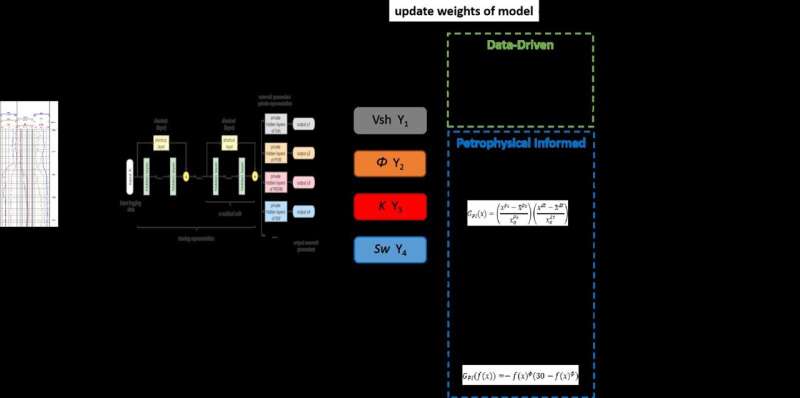This article has been reviewed according to Science X's editorial process and policies. Editors have highlighted the following attributes while ensuring the content's credibility:
fact-checked
proofread
Domain knowledge drives data-driven artificial intelligence in well logging

Data-driven artificial intelligence, such as deep learning and reinforcement learning, possesses powerful data analysis capabilities. These techniques enable the statistical and probabilistic analysis of data, facilitating the mapping of relationships between inputs and outputs without reliance on predetermined physical assumptions.
Central to the process of training data-driven models is the utilization of a loss function, which computes the disparity between the model's output and the desired target results (labels). The optimizer then adjusts the model's parameters based on the loss function to minimize the difference between the output and labels.
Meanwhile, geophysical logging involves a wealth of domain knowledge, mathematical models, and physical models. The reliance solely on data-driven models may sometimes yield outcomes that contradict established knowledge. Additionally, training data with uneven distribution and subjective labels can also impact the performance of data-driven models.
A recent study published in Artificial Intelligence in Geoscience reported the implementation of constraints on the training of data-driven machine learning models using logging response functions in well-logging reservoir parameter prediction tasks.
"Our model, called Petrophysics Informed Neural Network (PINN), integrates petrophysics constraints into the loss function to guide training," says the study's first author, Rongbo Shao, a Ph.D. candidate from China University of Petroleum-Beijing. "During model training, if the model output differs from petrophysics knowledge, the loss function is penalized by petrophysics constraints. This brings the output closer to the theoretical value and reduces the impact of labeling errors on model training."
Additionally, this approach helps in discerning the correct relationships from training data, particularly when dealing with small sample sizes.
"We introduce allowable error and petrophysical constraint weights to make the influence of mechanism models in the machine learning model more flexible," Shao elaborates. "We evaluated the PINN model's ability to predict reservoir parameters using measured data."
Shao and his colleagues found that the model has improved accuracy and robustness compared to pure data-driven models. Nonetheless, the researchers noted that selecting petrophysical constraint weights and allowable error remains subjective, hence requiring further exploration.
Corresponding author Prof Lizhi Xiao of China University of Petroleum underscores the significance of this research, "Integrating data-driven AI models with knowledge-driven mechanism models is a promising research area. The success of the PINN model in well logging is a significant step forward for geoscience in this direction."
Xiao emphasizes the need for continued refinement, "The selection of petrophysical constraint weights and allowable error, as well as the adaptability of domain knowledge to varying geological strata, present ongoing challenges. Additionally, the quality of datasets is crucial for the application of AI in geophysical logging. Comprehensive, publicly available well logging datasets with high quality and quantity are needed."
More information: Rongbo Shao et al, Reservoir evaluation using petrophysics informed machine learning: A case study, Artificial Intelligence in Geosciences (2024). DOI: 10.1016/j.aiig.2024.100070
Provided by KeAi Communications Co.




















